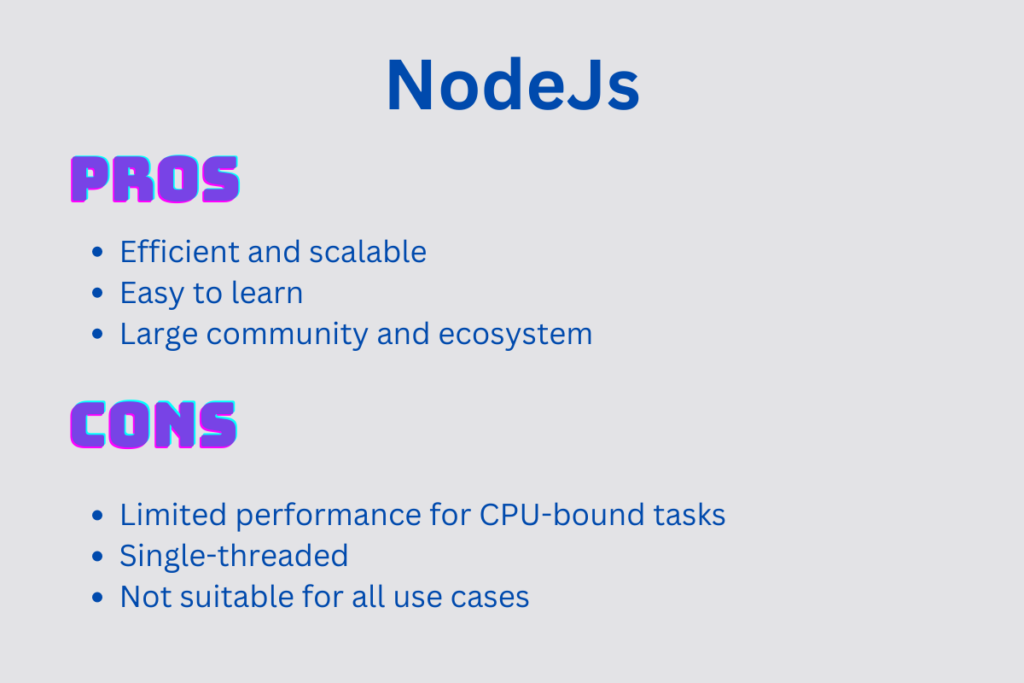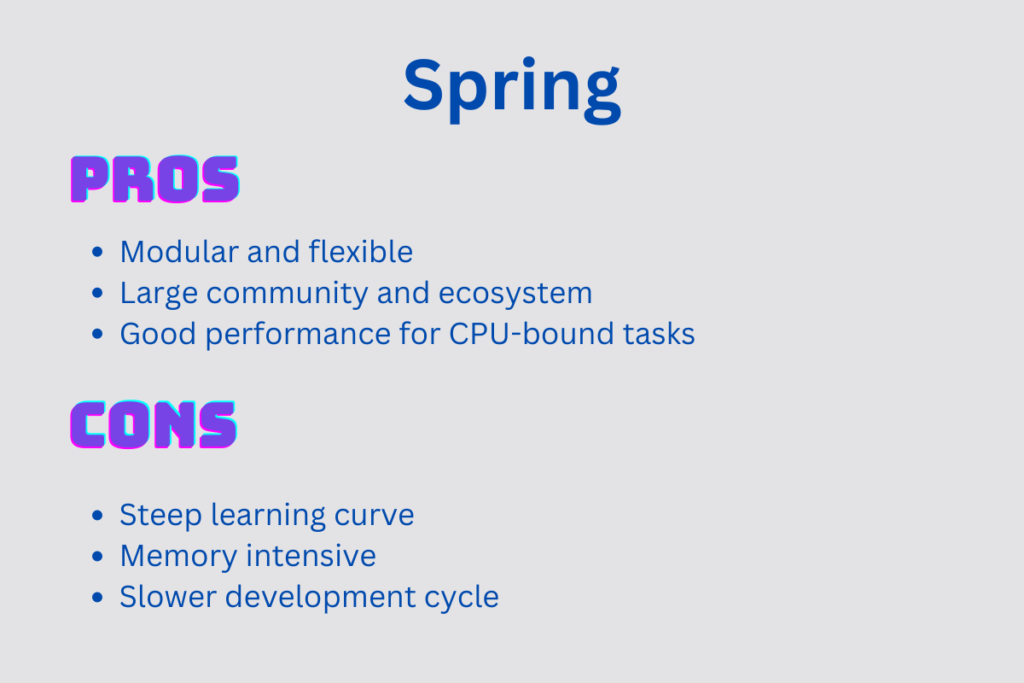New to Rust? Grab our free Rust for Beginners eBook Get it free →
NodeJS vs Spring: Which is Best for Your Next Enterprise Web Application?

Enterprise web applications are web-based tools that assist you to coordinate the demands and operations of your business both internally and externally. A web application helps you become ready for digital transformation and helps you adapt your business to the new demands of the digital world of today.
There are various tools and techs to build a great enterprise web application in which NodeJS and Spring are preferred over other options. Now choosing between these two can be confusing!
Although both NodeJS and Spring are well-liked frameworks for creating enterprise web applications, they offer significant advantages and disadvantages. The choice between NodeJS and Spring is based on the application’s specific requirements as well as the preferences and technical know-how of the development team.
This article will help you understand them better and then decide which is good for you. Let’s dig deep and find out the importance of using NodeJS and Spring.
Introduction to NodeJS
Node.js primarily created in JavaScript employs an event-driven, single-threaded, non-blocking I/O model. This makes it extremely effective and portable. Ideal for very data-intensive applications that must run in real-time across distributed devices.
For Node.js, non-blocking I/O is a fundamental concept. When learning about Node.js, it’s crucial to comprehend the idea of non-blocking I/O and asynchronous functions. This approach enables a thread to operate on a different task while it waits for another task to finish. In other words, progress on new tasks is not interrupted or delayed while waiting for the completion of other tasks. How to accomplish this? Here comes the Asynchronous functions or operations. Asynchronous functions are crucial to NodeJS. The benefit of this is that, since only a single thread is being used, we have minimal memory utilization.
Also Read: NodeJS worker threads
Introduction to Spring
Spring is a popular open-source Java framework that provides a comprehensive infrastructure for developing enterprise-level applications. It is an open-source lightweight framework used to create straightforward, dependable, and scalable enterprise applications. The primary goal of this framework is to offer you a variety of tools for managing your business objects.
Compared to traditional Java frameworks and Application Programming Interfaces (APIs), such as Java Server Pages (JSP), Java Servlet, and Java Database Connectivity (JDBC), it makes the building of Web applications considerably simpler. To create enterprise applications, this framework makes use of a number of novel approaches, including dependency injection (DI), aspect-oriented programming (AOP), and plain old Java objects (POJO). The Spring framework can be viewed as a group of layer-style sub-frameworks such as Spring AOP, Spring Object-Relational Mapping (Spring ORM), Spring Web Flow, and Spring Web MVC. Spring Framework consists of several modules, each of which provides a particular functionality for developing applications.
Pros and Cons: NodeJS vs Spring
To understand which one to choose, let’s now have a look at their pros and cons.
Pros of using Node.js
We have so many advantages of using NodeJS to build a web application, such as:
- Efficient and Scalable: NodeJS uses an event-driven, non-blocking I/O mechanism that enables it to process a lot of requests with a small number of resources.
- Easy to learn: NodeJS is based on JavaScript, so it is easy for developers who are already familiar with JavaScript to learn and use.
- Huge ecosystem and community: NodeJS has a huge, vibrant community and a fairly large ecosystem of libraries and modules.
Cons of using Node.js
Now let’s also look at the Cons:
- Limited performance for CPU-bound tasks: NodeJS is built for I/O-bound operations, which means that its performance for CPU-bound tasks can be limited.
- Single-threaded: NodeJS can only process one request at a time because it is single-threaded. When it comes to applications that demand intensive processing, this can be a bottleneck.
- Not suitable for all use cases: NodeJS may not be the best choice for certain types of applications, such as those that require real-time processing or large amounts of data manipulation

Pros of using Spring
Using the Spring framework does have various advantages, such as:
- Modular and Flexible: Spring may be used to create a broad variety of enterprise applications, from straightforward web applications to complex microservices structures.
- Large community and ecosystem: Spring has a large and active community, as well as a vast ecosystem of libraries and modules.
- Good performance for CPU-bound tasks: Spring is designed to handle CPU-bound tasks, making it well-suited for applications that require intensive or heavy processing.
Cons of using Spring
It’s also important to know about the limitations, so let’s check it out too!
- Steep learning curve: For developers who are unfamiliar with Java or enterprise programming, Spring might be challenging due to its steep learning curve.
- Memory Intensive: Spring applications have a tendency to use a lot of memory, which might be problematic for programmes that have a limited amount of resources.
- Slower development cycle: Developing and deploying Spring apps can take longer than doing the same for NodeJS applications.

Conclusion
Now that you understand the major differences, advantages and limitations of these two techs, you can now decide accordingly. A web application is not simple to create, so you must know how to build one and what requirements your company has. As a result, you will have better knowledge, and you can then hire the developer appropriately. Each framework has a distinctive quality. Both are successful, resulting in a favourable equilibrium for web developers. Ultimately, the best choice depends on the specific needs of the application and the skills and preferences of the development team.




